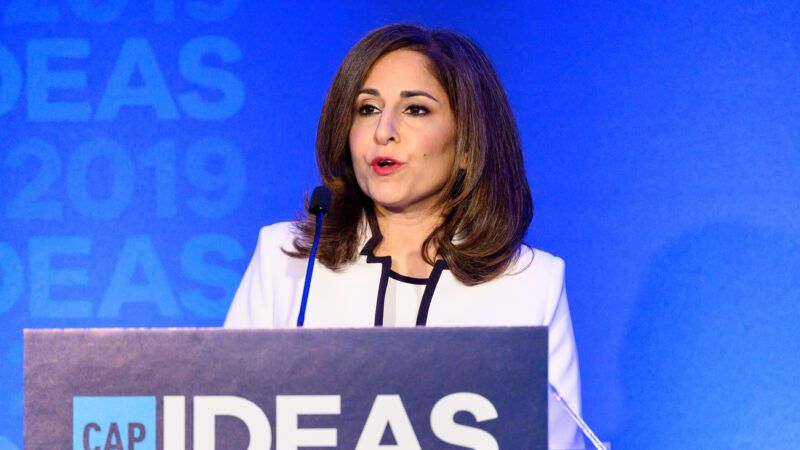Joe Biden's Pick for Top Economic Adviser, Neera Tanden, Endorsed Bill Creating a National Soda Tax
The national soda tax may be a small but telling example of how Tanden views policy making.

As the head of the progressive think tank Center for American Progress (CAP), Neera Tanden applauded and endorsed a Democratic proposal to implement a national soda tax. Now, she is one Senate confirmation vote away from becoming President-elect Joe Biden's top economic adviser.
Biden has tapped Tanden, who co-founded CAP in 2003 and has served as its president and CEO since 2011, to run the Office of Management and Budget (OMB). Her potential confirmation hearing has become the first major lightning rod for the incoming Biden administration, as Tanden has a long history of public feuds with Republicans (and some Democrats too), some of whom are now in a position to block her appointment.
More important than Tanden's inflammatory tweeting, however, are the policies she has endorsed—ones that she will now be in a position to see implemented via executive order or incorporated into the Biden administration's negotiations with Congress.
The national soda tax may be a small but telling example of how Tanden views policy making.
In 2019, Reps. Rosa DeLauro (D–Conn.) and Jan Schakowsky (D–Ill.) introduced the Medicare for America Act, a bill that despite its name would have expanded both Medicare and Medicaid to create a de facto universal health insurance program into which uninsured Americans would be automatically enrolled. The bill also created a series of new "public health excise taxes" to offset some of the costs of the new insurance program, including a national 1-cent tax per ounce on soda and other sugary drinks.
In a statement, Tanden praised the legislation—though not the soda tax, specifically. "This bold, affordable approach is overdue in America," she said at the time. "We applaud the progressive leaders today for introducing this landmark bill."
But the soda tax would actually be a regressive policy mostly burdening low-income households. And the cost is not insignificant. According to a review by Americans for Tax Reform, a conservative group that opposes tax increases, the proposed tax would add at least 55 cents to the price of a two-liter bottle of soda—hiking the final price nearly 50 percent in some places. A 12-pack of soda would increase in price by more than a dollar.
In places like Philadelphia, which has had a soda tax on the books since 2017, the main economic consequence has been a shift in where consumers buy their sugary drinks, not whether they buy them. A national soda tax would make it more difficult to dodge the cost by shopping somewhere else—it would sap consumers' wallets without much to suggest that it would make Americans healthier.
Philadelphia's soda tax has even been criticized from the left, including by Sen. Bernie Sanders (I–Vt.) who told NBC's Philadelphia affiliate last year that the tax was "fairly regressive" and counter to the progressive goal of asking "the people on top to pay more in taxes and not working people." He's correct. If there were a national soda tax, "about two-thirds of the revenues would be derived from middle-income households between $20,000 and $100,000," the Tax Foundation, a nonpartisan tax policy think tank, found in 2018.
The Medicare for America Act was never passed, and Tanden would not be in a position to implement it, or the soda tax, by herself from the OMB.
But Tanden's past support for legislation that would enact a harmful soda tax serves as another useful illustration of how one of Biden's likely top advisers views the job of setting federal tax policy. Tanden has tellingly said that the purpose of the federal budget is to "expand opportunity for all Americans."
But using budget policy to socially engineer individual choices and write paternalism into the tax code does not expand opportunity for all Americans at all. Like with soda taxes, that's an approach that won't create better outcomes for anyone, but that will ask poorer Americans to disproportionately bear the burden of federal policy makers' mistakes.


Show Comments (116)